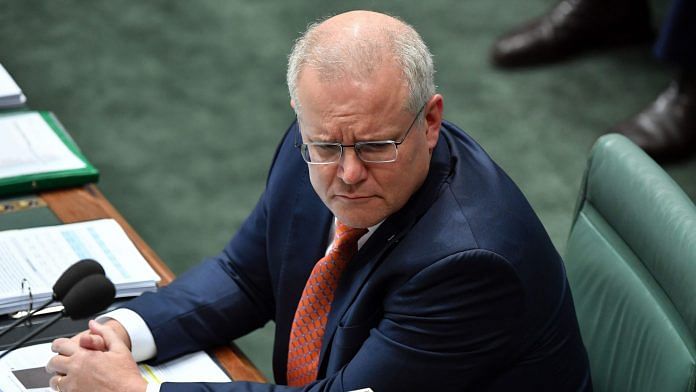Containing Covid-19 made something of a wartime prime minister of Australia’s Scott Morrison. But peacetime politics doesn’t look so great. The overwhelming urgency of fighting the virus suppressed the vulnerabilities underlying his government. Now they’re back to the fore. The return of a semblance of normality has seen the former marketing executive struggle to forge a post-Covid message. And given the morass of parliamentary sexual scandal confronting him, he needs one badly.
Central to this is the fragility of the government’s position in Parliament. A wafer-thin majority after the last election left Morrison and his conservative bloc very exposed to crises. The man once in charge of promoting Australian tourism used this to his advantage in 2020. Approval ratings went sky-high when he adopted a presidential style of leadership to combat the coronavirus; the less-respected legislature was secondary. Such popularity was never going to last. The abrupt and foul manner of its end, however, makes the opposition Australian Labor Party — once written off as too in thrall to unions and divided internally — look like a serious challenger in next year’s election.
Morrison’s government is reeling from allegations of sexual assault and lewd acts against legislators, their staff and a broader toxic culture within Parliament. The defense minister, in whose office a rape is alleged to have occurred two years ago, has been on medical leave, shielding the top national security official from scrutiny during what would have been bruising questioning in the Senate. The attorney general has been accused of a separate rape in the 1980s. He vigorously denies it and is pursuing defamation proceedings through the courts. Tens of thousands of protesters have taken part in rallies demanding greater female representation in Parliament and tough action against sexual violence and discrimination. On Thursday, a lawmaker in the New South Wales state parliament said he was stepping aside while police investigate allegations he raped a woman in 2019 — claims he denies. (My Bloomberg Opinion colleague Ruth Pollard wrote here about how the #MeToo movement is alive and well in Australia.)
Morrison will likely shuffle his cabinet, and you can count on more women being promoted. But this will be done from a position of weakness. The prime minister should be cruising rather than staggering. Covid has been suppressed, albeit by effectively shutting the continent off from the outside world. The economy is starting to hum and unemployment is quickly retreating. Gross domestic product will expand 4.5% this year, according to the Organization for Economic Cooperation and Development, making Australia one of the big winners from what’s projected to be a strong global rebound. Interest rates are almost zero and the central bank has pledged to keep juicing the economy for a while.
That performance had once made the prime minister so politically dominant he was said to be eyeing an early election. A rush to the ballot box has surely now been shelved. The lurid revelations of life in Parliament, added to almost daily, wound the government more than the opposition. Morrison, whose bloc has been in office almost a decade, will suffer the effects of this debacle. In a survey published last week, Newspoll, one of the most influential barometers of public opinion, found the ruling coalition trailing Labor 48% to 52%. Betting markets that foresaw an easy win for the government in the next election are tightening.
As much as Morrison has crashed down to earth, the numbers shouldn’t be too shocking. His position was never as invincible as sometimes portrayed. The come-from-behind win in May 2019 was remarkable only for how it defied polls, something seen in elections in other countries in recent years. In terms of parliamentary seats, the victory was meager: a majority of one, once the Speaker had been selected. The numbers on the floor weren’t very different from what they were on the eve of balloting. Voters may have developed a soft spot for “ScoMo,” a nickname he’s embraced for its laddish guy-next-door quality, but they aren’t as enthusiastic about the party he leads. Morrison’s approval ratings are consistently higher than those of the party, in part because of the bloc’s social conservatism.
Labor, similarly, was never as flat on its back as the shock loss implied. Leaders in the states of Queensland and Western Australia have easily prevailed over conservative challengers in recent provincial contests. In Victoria, the second-most populous state and home to Melbourne, Labor Premier Dan Andrews holds power despite a years-long onslaught from right-wing newspapers and pundits.
National Labor leader Anthony Albanese lacks luster. But he doesn’t repel voters. Albanese has been often criticized for not offering much of an alternative, but given the government’s current woes, he may not need to. It might be sufficient for the former deputy prime minister and one-time left-wing student leader to merely survive.
And in reality, are Morrison’s achievements all that great? Yes, the economy is coming back, in part thanks to unprecedented fiscal and monetary stimulus. Australia is hardly unique there! And is containing Covid really superhuman when borders are shut? Even Australians are finding it hard to get into their own country, let alone go anywhere else.
The prime minister must wonder what happened to his peace dividend. The more Covid subsides as the top political issue, the more perilous is his government’s position. The pandemic is no longer sweeping all before it. –Bloomberg
Also read: Looking forward to working on security in Indo-Pacific, says Modi after call with Australian PM
